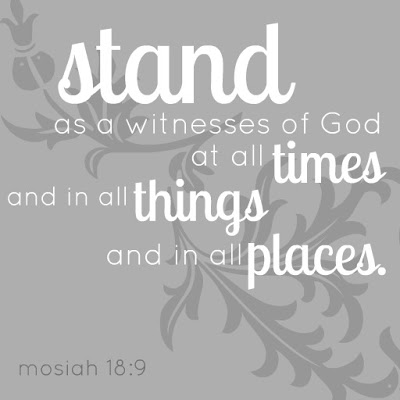The Exponent blog is sharing guest and reader responses to the news about women and children being able to serve as official witnesses for some Priesthood ordinance (baptisms and sealings), announced 2 October 2019. We welcome your contributions in the comments or as a guest post using this link
Granting women the opportunity to witness priesthood ordinances has long been an agitating point for many Mormon feminists, including previous posts here at the Exponent blog. Beginning in February 2016, Ordain Women launched a campaign, “Ready to Witness,” which included a letter writing component to church leaders. We are grateful and proud of the many women who made their voices heard in these campaigns and posts. True to our mission to elevate women’s voices, we share reader responses and feelings this week.

I am so proud of my friends at Ordain Women for their foresight in the Ready to Witness action that took place over many months. I think this is a perfect example of how the church needs to listen to those who are agitating for change. OW should be incredibly validated and proud of their action. I am disheartened that women and children are positioned as equals to each other in power and status, but not equal to men ages 11+. – ViolaDiva
*****
What we are witnessing is an ever growing positive shift toward gender equity in the world, and the church has just begun to give heed to the clarion call. Members of the church, this is important: do not invalidate the voices of the marginalized and BELIEVE THE VOICES OF WOMEN. We all have divine right to inspiration and just because a prophet has just now proclaimed it as truth does not mean it was a bad idea in the first place. Women have been speaking up against gender inequity for YEARS. Let us please learn from today’s news and start making the necessary changes in our life to right the wrongs and reject the status quo just because “that’s the way it is”. We have strong, courageous women to thank for this change because they were willing to turn their pain into action by writing letters to the apostles, sharing their stories, and refusing to be silent in the name of “humility and obedience”. I thank president Nelson for listening and doing the right thing, but these women deserve more credit, because they faced tangible risks for speaking out of turn. -BHC
*****
I’m so happy, and yet so disheartened that, once again, there are two groups of individuals in the church: Men, and others. – HHB
*****
Women were the first to witness the Savior’s resurrection. This makes total sense to me. I’m happy to have had an answer to something I thought was not logical in the past! – DJA
*****
I’m grateful for the work that Ordain Women and Mormon feminists do. Without them and their bravery, we would not be seeing progress (albeit slight progress). This was not the work of men, but persistent women. – SC
*****
Happy. I’m focusing on being happy for my 12 year old daughter, just starting her journey with the temple and ordinances. These are baby steps and I’m excited for the future. I am thrilled to be part of a church organization that does believe in change and revelation. As an organist, I have attended a variety of other faiths for years and there are pieces missing. As much as I enjoy the services, they are behind in the doctrine. Women in other churches I attend don’t long for more about Heavenly Mother, etc., because she isn’t even on their radar. – LP
*****
I’m so glad the Prophet of the Lord is finally receiving the same revelation my mom had 30+ years ago. – Helena
*****
it was, for a moment, thrilling to be given an official session of general conference, until they told us females ages 8 and up were part of it. And it was, for a moment, thrilling to be given an opportunity to witness as only males ages 11 and up have been able to do, until they went ahead and granted it to all the baptized children, too. Also, as ever, we may witness, but not do. Perhaps they feel they are giving us the same as the women who stayed with Jesus and bore witness, or as Mary who bore first witness, but we know that women were also disciples, also apostles, also doers. They also have the fortitude to do both.- anon
*****
I volunteered to attend the temple with the youth. I was asked, via text, if my husband could attend. I responded that my husband was not able to go, and I knew that they needed people who could perform the ordinances [or witness], and that he had no idea how much I wanted to be able to help with that. I went. I handed out towels. I felt that my service was unnecessary. It was a kind gesture to hand someone a towel, but they may have even preferred to take one out of a pile near the font and not be ogled in their semi-transparent and clingy wet jumpsuit. I know that would have been my preference. But what could the women do if not this? I watched the witnesses. I contemplated why I couldn’t do what they were doing? I have a PhD, surely I have the skills. It hurt. I am so glad that I will be able to do something more useful now. My daughter will not experience this same hurt. There will be other hurts, other inequalities…We will keep asking the questions, why not me, until there are no more question to ask.– Ginger
*****
I’m thrilled that there is a more meaningful way for me to participate in my children’s baptisms than giving a talk but now I feel like I have to ask myself do I take a role in the witnessing or afford my children the opportunity? It feels exciting but frustrating that my role and authority is still equal to that of an 8 year old. – anon
*****
I’m excited that my TBM mom who just started working the baptistery gets to be a witness even if she doesn’t seem to think it’s a big deal.-anon
*****
I have so many conflicting thoughts and feelings about this. It’s about time that this change was made as there was clearly no doctrinal reason for our exclusion. It’s frustrating that we have to “agitate” for these common sense changes towards what should be automatic inclusions and equalities. I’m excited that I may be a witness at my child’s upcoming sealing! It’s demoralizing yet again to be lumped in with children 8 and up. It feels like it’s too little too late for many and yet the brethren seem to be patting themselves on the back for these baby steps. – anon
*****
Let’s face it, they likely did it because they couldn’t find enough men to participate in the ordinances. -anon
*****
I just don’t know. I don’t know why I, as an adult woman, can only be allowed to bless others through my participation when children are given the same privilege. I don’t know how to accept that nothing has changed about the temple covenants, where I was explicitly second, and yet changes are being made that are supposed to make me equal. I don’t know how to celebrate the future without mourning for the past, without mourning what was missed. I don’t know how to process this change, because I don’t know what it will mean for me. Will witnessing my children’s baptisms, now that basically anyone can do it, be meaningful? Will it be special or perfunctory? Will anyone understand why it was important for a woman to fulfill that role? When will my church respect my whole self and allow me to bring all my skills and talents to serve in any way in the church? There is too much I do not know. – BKN
*****
I find it incredibly insulting that we’re expected to celebrate the fact that we are now sanctioned to officially watch men carry out an ordinance we ourselves are not allowed to perform.- anon
*****
I once went to the temple with the youth as part of my calling as a YW President. I eagerly took the chance to hand out towels because I desperately wanted to be a part of the experience with these youth. From my perch, with a towel in my hand, I watched as a youth was submerged – except for the fingers on her hand, holding to the priesthood leader’s wrist. I opened my mouth, and then I closed it, and then opened and closed it again – was my witness wanted? Would I be heard? After the second submerging, the same issue continuing, I opened my mouth to speak and a man spoke first – seeing the problem and requesting the correction. I have often thought back to that experience with confusion and pain and frustration. I’m glad it won’t be an experience repeated again for another woman somewhere. But I’m afraid there will continue to be reasons for confusion and pain and frustration. – AA
*****
I can’t help but wonder: why do all the headlines proclaim that the policy change is about women now being able to witness, but in truth it is that women AND children are now able to witness? It is like 1) they are embarrassed to admit in the headline that women and children are lumped into the same category – again – or 2) they hope women don’t read much more than the headline and thus feel super validated, because if they keep reading they will see that this is NOT about women, but about all who are not MEN. This is a bone thrown to the dog to keep “her” quiet, but there is no meat on that bone. At the same time, I am so glad that things are getting shaken up, non-men are being validated, and seeds are getting planted for bigger and more significant changes in future years. – JHL
*****
I have 4 sons and my youngest was baptized in March this year. When my third son was baptized I was miserable because there was no meaningful way for me to participate in his baptism because in our stake they don’t allow family participation in the baptism program. I felt like the only reason I needed to be there was to provide the food for the celebration afterwards. When my youngest was baptized I vowed not to be so angry, but I still felt marginalized and I jumped at the chance to say the closing prayer since he was the only person in our stake being baptized that day. This I feel happy for the change, but sad for the way I was excluded from my own sons’ baptisms. I’m grateful that the experience for today’s young women will be different. I also feel sad and angry that the way this announcement rolls out it feels like women=children. Men have held tightly to power for so long, and when they give a pittance away it’s extended to women and children at the same time. Perhaps I’ll be able to be a witness when my sons marry, but temple marriages are a lot more complicated with more people involved so that’s not a given. – Cynthia
*****
I have 2 sons. The youngest was baptized in July after I had kept putting it off for 6 months. He asked if I could baptize him. No, that has to be a man. I told him to pick 2 witnesses to watch him go under the water. He picked me. No, that has to be 2 men. I asked him to choose the confirmation circle. He picked me. No, those have to be men. And now I am angry. Don’t tell me to be grateful for changes. -SH
*****
Submit your stories or responses for this series by clicking here.






3 Responses
My husband served in a bishopric. He was tasked, when it came to performed baptisms, with the job of verifying that two Melchisedek Priesthood holders and temple worthy men were the baptismal witnesses, the implied doctrine being that the duty of a Melchisedek Priesthood holder needed to be acting as a witness. Same with the temple ordinances. This has been the protocol for years. I get confused when “doctrine” and “procedure” are used interchangeably, and feel gaslighted when things get spun to reflect a procedure, so it can be suddenly changed when social pressure is applied. If it wasn’t doctrinal to begin with, then why on earth would God disallow women to be a part of baptisms and temple ordinances? If we see examples in scriptures about women involvement (as apostles, ministers, leaders and witnesses), then why hasn’t policy and procedure been scriptural? What does that say about whom we choose to follow? If God is the same, yesterday, today and forever, why is he painted as changing his mind so much? Maybe this says more about people, than it does about God. What may seem at first like it’s a good thing, is hollow. We have placed way too much faith and trust in people, and not enough in God.
Thanks so much for gathering and sharing all these responses. I’m happy for the change, but also sad that such a simple change has taken so long to come about. And as many of the people quoted in the post have said, it’s insulting that Church leaders seem to not be able to see a difference between women and children. Like if they’re going to open it to any non-men (i.e., the important members), then why not open it to everyone, because it clearly doesn’t matter. Ugh.
In my view this change is not about lumping women and children together, It’. rather paving the way for families to participate together in ordinances in a new way. A family could now “staff” a baptismal session in the temple. The ordinance of a living baptism can now be officially witnessed eclusively by close family members. It means chldren will grow up with new temple experiences and assisting in priesthood ordinances. It will fortify a growing generation for even more turbulent times than what we are seeing now. I think this change above all is about families, hastening the work and strengthening the youth for the turmoil preceeding the second coming of the Lord.
(I hope I have not hurt anyone’s feelings in talking about families. I am myself a single, middle aged woman struck down with an illness that leaves no room for meeting someone, but that’s the deal and I take it one day at a time. I’m OK with the focus on families, because I can see the need for it.)